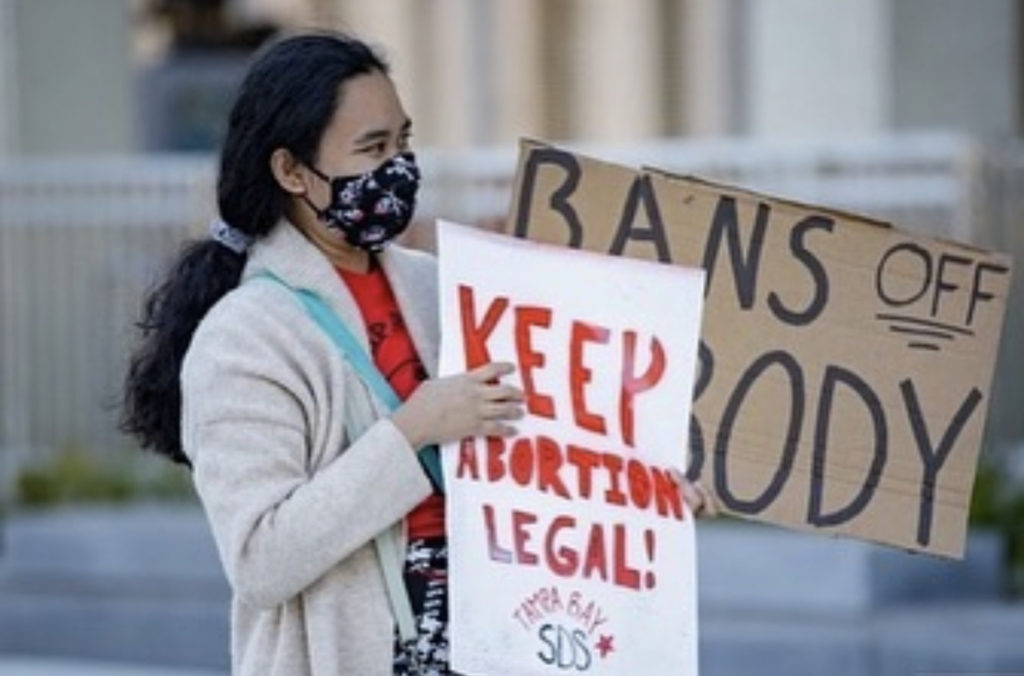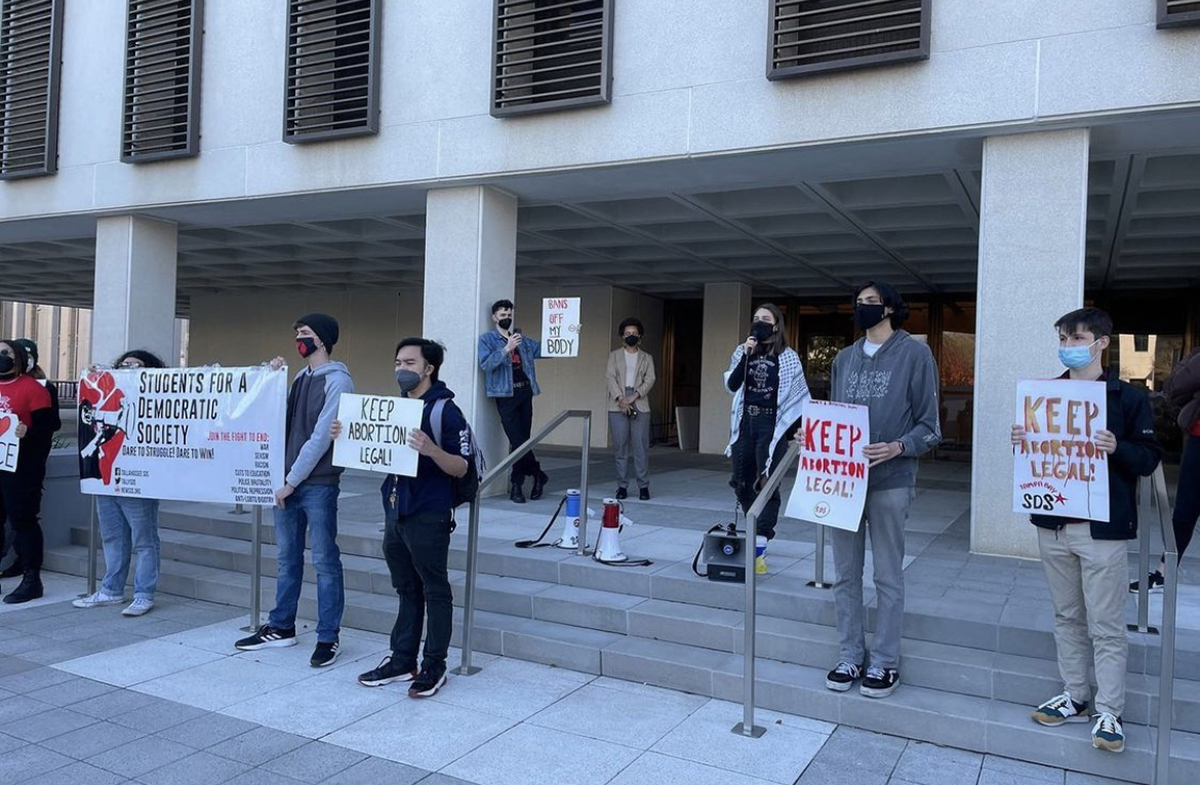The bill redefines the legal abortion timeframe from 24 weeks to 15 weeks.
Courtesy of @tampabay_sds on Instagram
By Sofía García Vargas
Roe v. Wade is challenged again by a new Florida bill, House Bill 5, seeking to shorten the legal timeframe to get an abortion from 24 weeks to 15.
Sponsored by Republican representatives Erin Grall and Jenna Persons-Mulicka, the bill was first filed on Jan. 11 and looks to prohibit physicians from performing abortion procedures if the gestational age of the fetus is more than 15 weeks, according to the Florida Senate.
The bill provides the exception when the fetus has a “fatal abnormality.” To qualify for this exception, two physicians must certify in writing that in their “reasonable medical judgment,” the fetus would not survive. However, it does not provide protections for victims of rape and incest.
On Jan. 19, the Professions & Public Health Subcommittee held the first hearing of the bill. Without opposition outside of Democratic Party members, the bill was passed on a 12-6 vote. This pushed the bill forward to the next Health Care Appropriations Subcommittee’s scheduled meeting.
Even though there had been previous community discomfort toward the proposal, the Jan. 19 decision ignited the need for a bigger mobilization across Florida.
Three chapters of the Students for a Democratic Society (SDS) came together and organized a protest that took place on Jan. 27 in Tallahassee, the same day the Health Care Appropriations Subcommittee reviewed the bill.
Chapters from the University of South Florida, Florida State University and the University of North Florida (UNF) protested at the State Capitol to oppose HB 5.
“Our number one priority is to stop the bill from being passed,” Taylor Cook, member of the USF SDS chapter, said to The Crow’s Nest in an interview prior to the protest. “We want to educate people on how it’s not only a women’s issue, but also a reproductive rights issue. So, transgender people and non-gender conforming people are also deeply affected by it.”
“We aim to educate and remind officials that they are supposed to be representing the interests of the state and not the few,” Tionna Jefferson, a member of UNF’s SDS chapter, said.
The Jan. 27 meeting faced debate from both sides of the political scope.
Opponents argued that HB 5 is “unconstitutional” and takes away people’s ability to make private decisions for their health.
In contrast, Rep. Dana Trabulsy, R-Fort Pierce, said that the 15-week timeframe is more than should be granted.
“Fifteen weeks? That’s a long time. To me, because I believe life begins at conception, that’s generous,” Trabulsy said.
Shortly after just half an hour of public testimony at the meeting, R-Miami Springs and Chairperson of the Health Care Appropriations Subcommittee Bryan Avila, interrupted a testifying student and cut public feedback short, claiming it was in “the interest of time.”
Accompanying students started chanting “let her speak” as the testifying student was escorted out of the room. Moments later, everyone, except for journalists and lawmakers, was asked to leave.
At the end of the meeting, the bill was passed with a party-line 10-5 vote.
The bill will appear next before the Health & Human Services Committee. If approved into law, it will take effect July 1.
The decision was a disappointment, but not a surprise, to those against the bill, which say that their fight doesn’t stop in Tallahassee.
“There’s the potential for more statewide mobilizations,” Cook said.
HB 5 comes with a companion bill, Senate Bill 146, which also seeks to reduce the abortion timeframe and redefine the concept of “medical abortions,” but it’s still under review.

Florida joins Texas, Mississippi and West Virginia in the effort to ban abortion procedures. Just last September, Texas signed the Heartbeat Act, prohibiting abortions after the first detection of a heartbeat, which is around the six-week timeframe. Mississippi has a similar bill as Florida currently under the review of the U.S. Supreme Court and West Virginia introduced a comparable plan earlier this month.
Currently, Florida law prohibits abortions during the third trimester, which begins at the 24th week of gestation, with certain medical exceptions.
HB 5 also looks to require medical reports for why the abortion was performed and be sent to the state’s Board of Medicine and Board of Osteopathic Medicine.
Furthermore, it proposes a collaboration between the Florida Department of Health and “local healthy start coalitions for the creation of fetal and infant mortality review committees” across the state.
The committees would review and analyze rates, trends, causes and data for infant mortality and morbidity in each geographic area to create policy changes to reduce these trends.
Before the Jan. 27 meeting recess, the committee increased the potential funding for these regional committees from $260,000 to over $1.6 million.
In addition to reproductive rights concerns, the bill is also criticized for its effects on low-income, rural Florida residents.
“This bill is terrible for all Floridians, particularly for those who are low-income, live in rural areas, or are people of color who have historically faced inequitable access to quality healthcare, or low-income people who cannot afford to travel out of state for a safe abortion,” Florida Rep. Fentrice Driskell, D-Tampa, said.
Jefferson echoed Driskell’s opinion on how this bill affects those with limited access to healthcare.
“It’s expensive to have children but it is also expensive to be pregnant. People need access to doctors, medications and regular check-ins while pregnant. If they are low-income, they won’t have the ability to afford those necessary appointments,” Jefferson said. “Then those people are not able to seek comprehensive medical services to make sure they have a safe and healthy pregnancy. Once the child is born, they will require food, clothing, shelter, childcare, etc. So, there are financial and medical obligations while being pregnant and afterwards. This bill completely ignores the people and families that are struggling.”
Opposing lawmakers also discussed the bill’s possible fiscal and legal impacts, as it threatens to bring lawsuits against the state.
Earlier this month, Florida Gov. Ron DeSantis indicated that if the bill passes all required steps, he would sign it.
“I’m supportive of 15 weeks. I think that’s very reasonable, and I think that’s very consistent with being supportive of protecting life,” DeSantis said.
However, Driskell voiced his opposition saying, “we should make them legal and accessible, and then we should stay the hell out of the way.”



